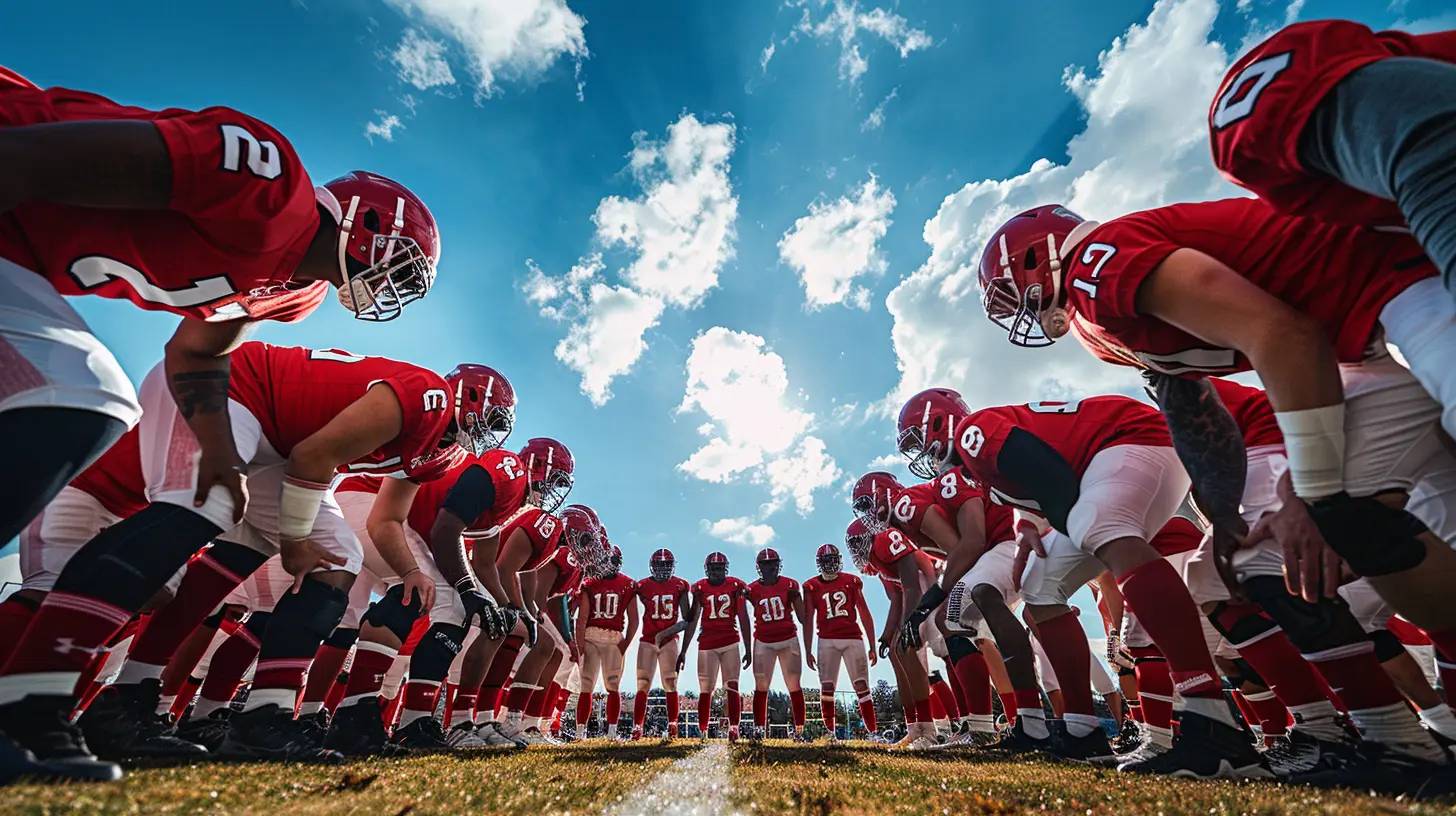Essential Communication Tips for Team Captains
7 July 2025
Being a team captain isn’t just about rocking the armband or giving pep talks before a game — it’s about leading with clarity, empathy, and confidence. Whether you're on the court, the field, the track, or even in an eSports arena, your ability to communicate effectively can shape your team's chemistry, performance, and overall success.
Think about it: communication is the glue that binds your squad together. It keeps everyone on the same page, boosts morale, and turns a group of individuals into a well-oiled machine. So, if you're stepping into that leadership role (or trying to level up), let's dive into some powerful communication tips that’ll make you the kind of captain every teammate wants to follow.
🗣️ Understand Your Role as Communicator-in-Chief
First things first — understand what your role as a communicator actually means. You're not just passing on info from coaches or calling plays during a game. You're the voice of unity, the bridge between athletes and authority, and the heartbeat of the team’s morale.It’s like being the Wi-Fi router of the squad. If your signal is weak or patchy, people get disconnected, confused, and frustrated. Strong communication, though? That’s full bars, baby.
👂 Listen First, Speak Second
Here’s a truth bomb: great communicators are even better listeners.As a captain, it's tempting to always speak first or try to fix every situation with a motivational speech. But sometimes, your teammates just need a listening ear. Let them talk. Hear them out.
- Is someone frustrated?
- Is there tension between teammates?
- Are they unsure about their role?
By genuinely listening, you earn trust. And trust is the strongest currency in any team.
Pro Tip: Don’t listen to respond. Listen to understand. Huge difference.
🧠 Tailor Your Message to Your Audience
Not everyone on your team communicates the same way. Some are loud and high-energy. Others are quiet but observant. As a captain, you’ve got to know how to adapt your message to fit each person.Think of it like coaching. A coach doesn’t scream at a sensitive player who responds better to 1-on-1 talks, right? Same goes for you.
- The hype players may thrive with fiery speeches.
- The analytical ones might prefer calm, strategic discussions.
- The anxious ones may need reassurance, not pressure.
Know your people — then speak their language.
🔄 Keep It Clear and Concise
You're in the heat of a game. Time is ticking. Emotions are high.Now’s not the time for novels.
Practice the art of clear, concise communication. Say what you need to say in a way that everyone gets it, instantly.
Instead of:
“Okay guys, let’s try to be more aggressive and maybe try shifting to a 4-4-2 formation if that seems to be working better…”
Try:
“Let’s switch to 4-4-2 NOW. Press high. Let’s go!”
Clear. Simple. Actionable.
💬 Use Positive Reinforcement
Yelling at someone for messing up? That’s easy. Encouraging them in the face of failure? That’s leadership.The best team captains know how to use positive reinforcement to build confidence and foster growth.
- Instead of, “You always miss those shots.”
- Say, “You’ve got this next one — keep shooting, it’ll fall.”
That doesn’t mean sugarcoating everything. It means focusing on solutions and growth, not just problems.
🧊 Stay Cool in the Heat
Every captain faces pressure — tight games, bad calls, internal conflict. Your reaction in those high-stress moments sets the tone for the entire team.You’re the thermostat, not just the thermometer. When things get heated, you don’t reflect the temperature — you regulate it.
- Stay composed.
- Breathe before reacting.
- Think before speaking.
Being calm doesn’t make you passive — it makes you powerful.
🔁 Encourage Two-Way Communication
Being a captain doesn’t mean you always talk while others listen. That’s a one-way street — and it usually leads to a dead end.Instead, create an environment where everyone feels safe to speak up. Ask questions like:
- "What are you guys seeing out there?"
- "Any ideas to mix things up?"
- "How are you feeling physically?"
Open dialogue builds team ownership. When people feel heard, they’re way more likely to buy in.
📱 Use Technology to Your Advantage
Let’s face it — group chats, DMs, and video reviews are part of modern sports. Use them to keep everyone informed, connected, and motivated.Set up a private chat for team strategy. Drop motivational quotes or highlight reels. Share practice clips for individual feedback.
But don’t overdo it. Nobody wants 100 messages about tomorrow’s warm-up gear.
Keep it relevant. Keep it uplifting. Keep it team-focused.
🧭 Be Honest, But Not Brutal
Real talk: sugarcoating isn’t your job. But neither is tearing someone down.Honesty builds respect, but the way you deliver the truth matters. If someone’s not pulling their weight, have a private chat. Be direct, but empathetic.
- “I know you care about the team, and I’ve seen you bring better. What’s going on?”
- “We need more urgency from your side. How can we make that happen?”
It’s about improvement — not shame.
🌱 Give and Receive Feedback Like a Pro
Feedback isn’t a one-way mirror. Yes, captains should give feedback — but they also need to take it in stride.If a teammate says, “Hey, I didn’t really understand your call in the second quarter,” don’t get defensive. Thank them. Clarify next time.
The moment you stop learning is the moment you stop leading.
🕊️ Handle Conflict with Grace
Even the tightest teams hit potholes — disagreements, miscommunications, missed expectations. Conflict is normal.But as the captain, you’re the conflict diffuser, not the flame-fanner.
- Don’t pick sides — seek solutions.
- Separate facts from emotions.
- Remind everyone of the bigger picture: the team’s success.
Sometimes, it’s about calling a team meeting. Other times, it’s about pulling two players aside for a quick chat. Either way, deal with drama early before it becomes contagious.
🏆 Inspire With Your Words AND Actions
Words are powerful — but actions? Even more.You can’t slack off and expect others to hustle. You can’t complain and expect positivity from your squad.
Your communication starts long before you open your mouth. It’s in how you show up:
- Early to practice.
- Focused during drills.
- Vocal during games.
- Supportive on the sidelines.
Be the kind of teammate others want to mirror.
💡 Keep Growing as a Communicator
Look, no one’s born a master communicator. It’s a skill — just like dribbling, passing, or setting up plays. And like any skill, it can be improved.- Read leadership books.
- Watch how elite captains carry themselves.
- Ask your teammates, “How can I serve you better?”
- Notice what works — and ditch what doesn’t.
You don’t have to be perfect. You just have to be willing to grow.
Final Thoughts: You’re the Voice of the Team
Being a captain is a privilege. But more than that — it’s a responsibility.You’re the one your teammates look to when the game’s on the line. When eyes are wide with fear. When players are frustrated, broken, or just plain tired.
Your voice can bring calm. Your words can inspire. Your actions can lead.
So don’t take communication lightly. Embrace it. Hone it. Master it.
Because at the end of the day, scores fade and seasons end — but real leaders? They leave legacies.
all images in this post were generated using AI tools
Category:
Team SportsAuthor:

Preston Wilkins
Discussion
rate this article
1 comments
Harrison Ruiz
This article highlights key communication strategies vital for team captains. It’s a reminder that effective leadership relies on clear dialogue and active listening. Implementing these tips can foster trust and collaboration, ultimately enhancing team performance and cohesion. Great insights!
July 23, 2025 at 4:49 AM

Preston Wilkins
Thank you for your thoughtful feedback! I'm glad you found the insights valuable for fostering trust and collaboration in leadership.


